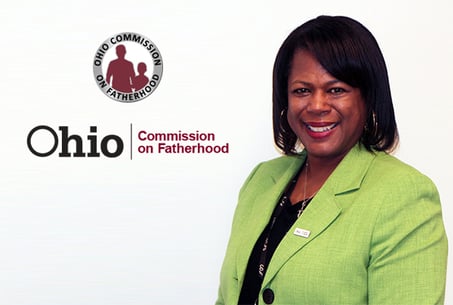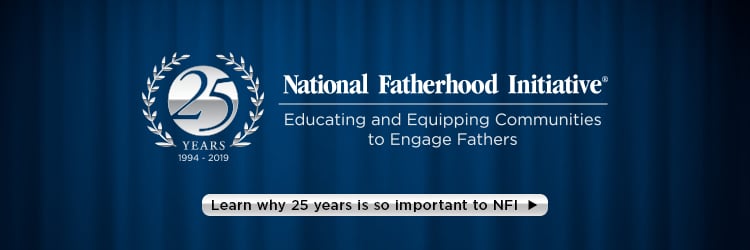25 Years of NFI: Featuring Kim Dent of the Ohio Commission on Fatherhood, Part 1
7 min read

I’ve seen many statewide fatherhood initiatives come and go in my two decades at National Fatherhood Initiative® (NFI). Most have lacked staying power.
The statewide initiative in Ohio is an exception. That's why when our staff made recommendations to identify fatherhood champions to feature during our 25th anniversary, the first person who popped into my mind was Executive Director Kim Dent of the Ohio Commission on Fatherhood (OCF). I’ve known Kim for many years. She’s one of the most committed fatherhood champions I’ve known. She’s a sought-after speaker on father involvement, especially when it comes to ways in which states can intentionally and proactively support serving fathers at the local level.
Recently I interviewed Kim to learn more about her background, her role with OCF, how OCF has partnered with NFI, and more. She had so much valuable information to share that it called for a two-part blog post. We’ll publish the second part later this week.
Kim’s Current Role and How the Commission Supports Service to Fathers
“I am the Executive Director of the Ohio Commission on Fatherhood. OCF is codified in Ohio Revised Code, 5101.34 effective 1999 as part of the state fiscal year 2000/2001 mid-biennial budget. OCF is housed in the Ohio Department of Job and Family Services, Office of Family Assistance. The office is supported by TANF dollars under purposes 3 and 4.
OCF funds programs that serve low-income fathers and families by providing parenting education and healthy co-parenting skills, as well as, job readiness and employment retention skills. OCF recommends policy changes that are father-friendly and father-inclusive. OCF brings an awareness to the important role fathers play in their children’s lives through various presentations throughout the state. Our staff travel to speak in prisons, family service organizations, businesses, government agencies, etc. Lastly, OCF trains practitioners through a state fatherhood conference that is mandated, via statute, to be held once every four years.
OCF provides funding to local fatherhood programs. There were two levels of funding in our most recent round, our current round. Level A is $125,000 every year for organizations that serve two or more counties. We funded five such organizations. Level B is $55,000 every year for organizations that serve one county. We funded two such organizations. Funding for both levels lasts two years. The current funding ends on June 30, 2019.”
How Kim Landed at OCF
“I began my government work in a county child support agency in Ohio. I transferred to the State Office of Child Support (OCS) a few years later where I held various positions like program consultant and business analyst. I assisted the county child support agencies with compliance and performance measures. I also worked in various supervisor positions that included County Services and as an OCS policy supervisor.
As OCS worked toward re-branding the agency to align with (federal) OCSE’s re-brand under Commissioner Vicky Turetsky, OCS created a new unit called Outreach, Education and Grants Management. I worked on various grant projects there and presented to communities on the services provided by OCS. A significant part of those presentations involved removing myths about OCS while bringing a more family-friendly tone to the program.
During my time in the outreach unit, I was asked to represent the Ohio Department of Job and Family Services Director on the OCF as a commissioner. OCF statute mandates the structure of the 20-member commission, which includes members of the General Assembly (bi-partisan), the Governor’s Office, the Ohio Supreme Court, members of the public and several state departments. As a commissioner, I had an opportunity to work alongside other commissioners on various father and family topics. I was asked to temporarily fill in for the Executive Director, who was on medical leave; therefore, I worked for the Office of Child Support and Family Assistance (TANF Office) where I provided staff oversight and assisted staff with drafting and posting funding opportunities. The temporary assignment advanced to a permanent offer after nine months.”
Kim’s Life Growing Up and Its Impact on Her Role
“I have sincere passion for this work because of my life growing up. My father passed away the day before my fifth birthday. There are some pretty special moments I remember even that far back. I always wondered what my life would have been like if he hadn’t passed away.
I grew up with an enormous void in my life. My mother and grandmother were two very strong women and instilled ethical values in my life and in my siblings’ lives. I grew up in a middle-class suburban home with Christian values, love for family, protection of babies and children at all costs, and a high regard for education. I felt very blessed; however, there was something missing, and I could never quite put it into words what I was missing in my life.
I met my first husband in high school. We were sophomores, and dated until we graduated, at which time we married. We were too young to be married; therefore, the marriage didn’t work out. Shortly after, I married my best friend, still trying to figure out and define the type of husband I wanted to spend the rest of my life with and raise a family. Because I didn’t quite have the definition defined at that time, the marriage ended. We are still friends and did and continue to do an amazing job co-parenting our three children.
I eventually realized that the void in my life that continued to cause me to make bad decisions regarding relationships was due to the absence of a strong male role model in my life; therefore, I knew how important my children’s father’s role would be, and I made every effort to support their relationship. My kids love their dad, and he is an amazing father to them. We both have a common love for our children and know how important it is to support one another in the best interest of our children.”
Kim’s Picture of How Ohioans View Fatherhood
“For the most part, fatherhood services are viewed as a necessary support for families with the goal of ensuring Ohio’s children are supported emotionally, physically, financially, and spiritually. We don’t have barriers to engaging dads in terms of our systems because of the structure of OCF with representatives from all three branches of government, state agencies, and members of the public. So, there is an understanding of why and how dads are important to families. Sometimes, however, when implementing father-friendly policies at the state level, it can take a while for those changes to filter down to the direct-service level in terms of practice with serving fathers.
Working with fathers has a lot of support from the very top level of state government. When current Governor Mike DeWine was Governor-elect, he immediately communicated his focus on the well-being of Ohio’s children. His administration has developed various children’s initiatives and supports for their families, such as through the establishment of new offices and increased resources for those supports. Additionally, the Information Memorandum released by the Administration for Children and Families at the U.S. Department of Human Services in October 2018 confirmed the importance of the fatherhood work in Ohio over the past decades. Ohio definitely leads the nation in realizing the importance and value of fathers by the state’s continued support of OCF.”
How OCF and NFI Have Partnered
“NFI has partnered with OCF on several initiatives, such as training the original 12 counties in the Ohio County Fatherhood Mobilization Initiative. Since the training of those original pilot counties, OCF has trained an additional 12 counties and is in contract with four counties to complete their county action plan by end June. OCF has also relied on the various Father Facts editions. Father Facts contains very compelling research and data as it relates to child outcomes in various stages of their lives and how father absence can negatively impact those outcomes. OCF recommends to organizations various NFI evidence-based and evidence-informed curricula that include 24/7 Dad®, Fathering in 15™, and the Understanding Domestic Violence™ Booster Session. The organizations funded during the next biennial grant cycle will be required to implement the booster session, regardless of the fatherhood program they use.
The ability to use Father Facts has been the most valuable NFI resource for OCF. Not only the information in the full publication, but the free Father Facts images. One of OCF’s roles is to raise awareness about the importance of fathers. The images are very useful for presentations. They provide a great visual for me that connects the audience to the passion with which I deliver information on the importance of fathers. I can include them in a PowerPoint or print them as a handout. The full publication also helps me target the data I share with specific audiences; for example, if I speak to educators, I can share data on the benefits of father involvement to children’s academic achievement. A close second is the Understanding Domestic Violence™ Booster Session. It’s geared toward fathers and perfect for an organization to infuse in any fatherhood curriculum they use.”
Join us for Part 2 later this week to hear from Kim’s experience: what’s important for fathers to know, what organizations and states need to know when working with fathers, and more.
Date Published: 05/28/2019
Last Updated: 05/28/2019
Take action and spur positive change in your local communities
Download the ebook to learn how to create fatherhood initiatives that engage every sector of community life.
%201.png?width=149&height=82&name=NFI_logo_blue_left%20(1)%201.png)
%201.png?width=119&height=65&name=NFI_logo_blue_left%20(1)%201.png)
%201.png?width=119&height=66&name=NFI_logo_blue_left%20(1)%201.png)



%201%20(1).png?width=148&height=88&name=NFI_logo_blue_left%20(1)%201%20(1).png)
